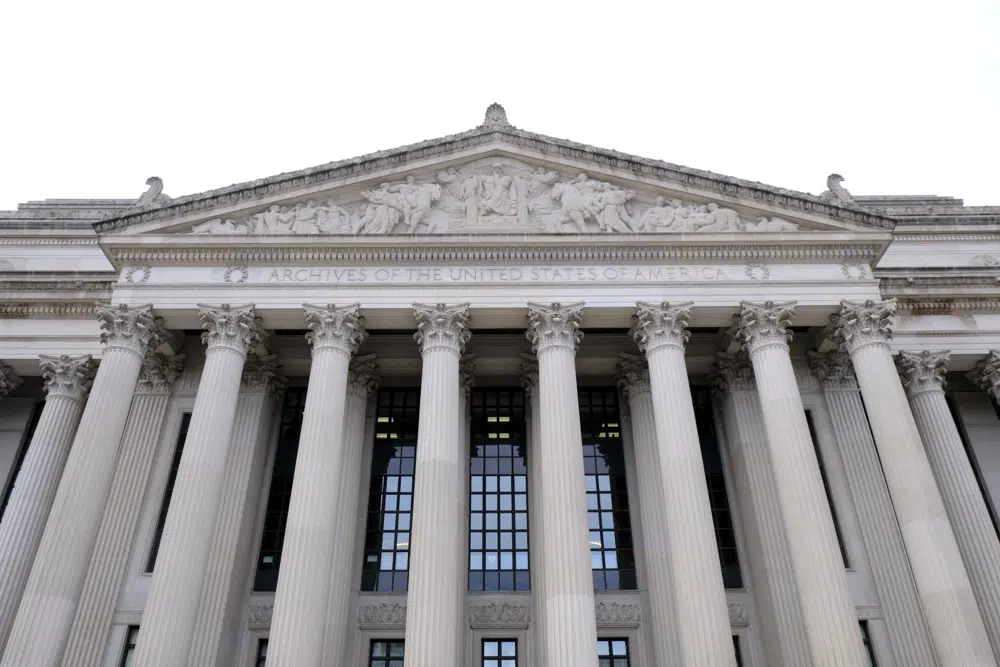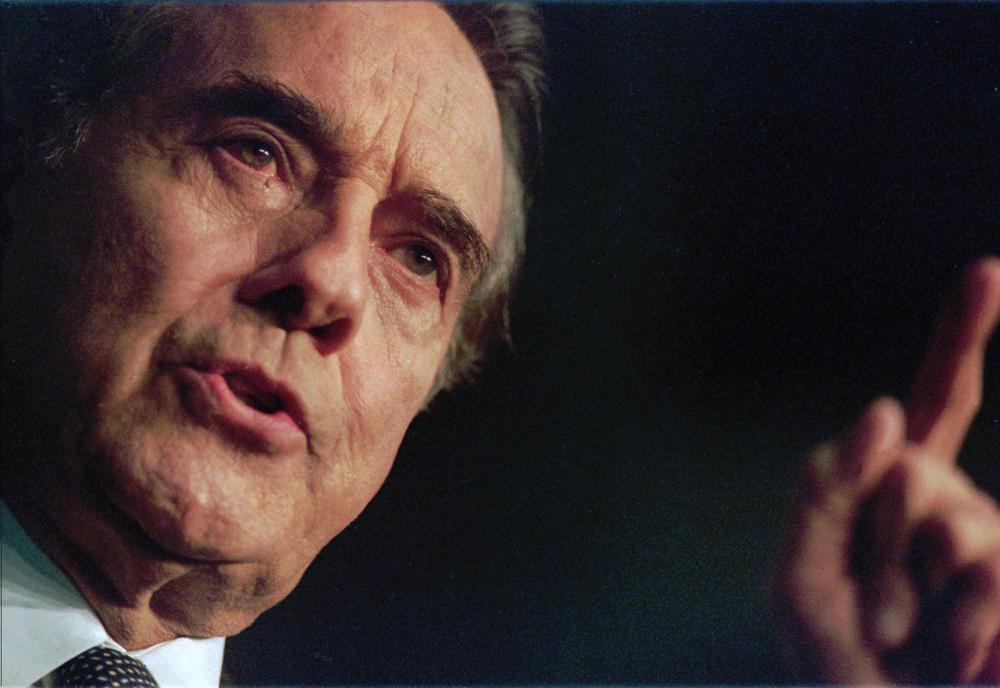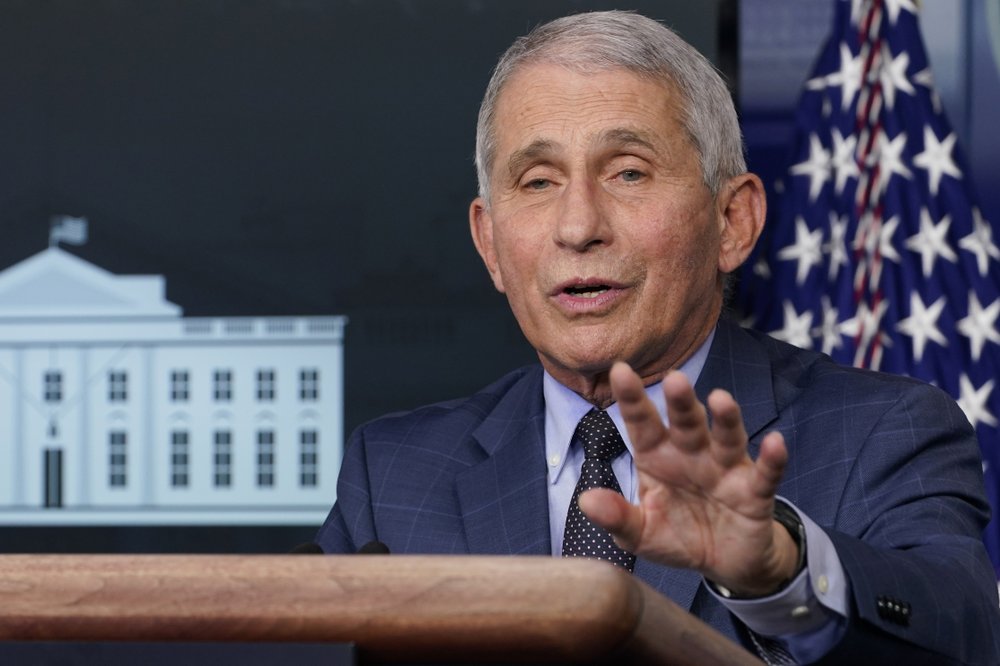Past U.S. presidents, VPs asked to recheck for classified docs

The National Archives has asked former U.S. presidents and vice presidents to recheck their personal records for any classified documents following the news that President Joe Biden and former Vice President Mike Pence had such documents in their possession, two people familiar with the matter said Thursday. The Archives sent a letter Thursday to representatives of former presidents and vice presidents extending back to Ronald Reagan to ensure compliance with the Presidential Records Act, according to the two people, who spoke on condition of anonymity because they were not authorized to speak about investigations. The act states that any records created or received by the president are the property of the U.S. government and will be managed by the archives at the end of the administration. The Archives sent the letter to representatives of former Presidents Donald Trump, Barack Obama, George W. Bush, Bill Clinton, George H.W. Bush, and Ronald Reagan, and former Vice Presidents Pence, Biden, Dick Cheney, Al Gore, and Dan Quayle, they said. The letter was first reported by CNN. Spokespeople for former presidents Trump, Obama, George W. Bush, and Clinton and former vice presidents Pence, Dick Cheney, Al Gore, and Dan Quayle did not immediately respond to requests for comment. Biden’s lawyers came across classified documents from his time as vice president in a locked cabinet as they were packing up an office he no longer uses in November. Since then, subsequent searches by the FBI and Biden’s lawyers have turned up more documents. Former Vice President Pence, too, this week, discovered documents and turned them in after saying previously he did not believe he had any. The White House did not immediately respond to a request for comment, but the searches by Biden’s attorneys and the FBI appear to fulfill the Archives’ request. The Archives had no comment. Handling of classified documents has been a problem off and on for decades, from presidents to Cabinet members and staff across multiple administrations stretching as far back as Jimmy Carter. But the issue has taken on greater significance since former President Donald Trump willfully retained classified material at his Florida estate, prompting the unprecedented FBI seizure of thousands of pages of records last year. Attorney General Merrick Garland appointed a special counsel to investigate Trump’s handling of the documents and also Biden’s. It turns out that officials from all levels of government discover they are in possession of classified material and turn it over to authorities at least several times a year, according to another person familiar with the matter who spoke on the condition of anonymity due to the sensitive nature of classified documents. Current and former officials involved in the handling of classified information say that while there are clear policies for how such information should be reviewed and stored, those policies are sometimes pushed aside at the highest levels. Teams of national security officials, secretaries, and military aides who share responsibility for keeping top-level executives informed — and the executives themselves — may bend the rules for convenience, expediency or sometimes simple carelessness. While much of the attention has been on classified information, the Presidential Records Act actually requires that, from the Reagan administration onward, all records must be transferred to the Archives regardless of classification. It’s against federal law to have classified documents at an unauthorized location, but it’s only a crime if it was done intentionally. Speaking Thursday at an unrelated news conference, FBI Director Christopher Wray said that though he could not discuss any specific ongoing investigation, “We have had for quite a number of years any number of mishandling investigations. That is, unfortunately, a regular part of our counterintelligence division’s and counterintelligence program’s work.” He said there was a need for people to be conscious of laws and rules governing the handling of classified information. “Those rules,” he said, “are there for a reason.” Republished with the permission of The Associated Press.
Senate leader, presidential candidate Bob Dole dies at 98

Bob Dole, who overcame disabling war wounds to become a sharp-tongued Senate leader from Kansas, a Republican presidential candidate and then a symbol and celebrant of his dwindling generation of World War II veterans, died Sunday. He was 98. His wife, Elizabeth Dole, said in an announcement posted on social media that he died in his sleep. Dole announced in February 2021 that he’d been diagnosed with stage 4 lung cancer. During his 36-year career on Capitol Hill, Dole became one of the most influential legislators and party leaders in the Senate, combining a talent for compromise with a caustic wit, which he often turned on himself but didn’t hesitate to turn on others, too. He shaped tax policy, foreign policy, farm and nutrition programs, and rights for the disabled, enshrining protections against discrimination in employment, education, and public services in the Americans with Disabilities Act. Today’s accessible government offices and national parks, sidewalk ramps, and the sign-language interpreters at official local events are just some of the more visible hallmarks of his legacy and that of the fellow lawmakers he rounded up for that sweeping civil rights legislation 30 years ago. Dole devoted his later years to the cause of wounded veterans, their fallen comrades at Arlington National Cemetery, and remembrance of the fading generation of World War II vets. Thousands of old soldiers massed on the National Mall in 2004 for what Dole, speaking at the dedication of the World War II Memorial there, called “our final reunion.” He’d been a driving force in its creation. “Our ranks have dwindled,” he said then. “Yet if we gather in the twilight, it is brightened by the knowledge that we have kept faith with our comrades.” Long gone from Kansas, Dole made his life in the capital, at the center of power and then in its shadow upon his retirement, living all the while at the storied Watergate complex. When he left politics and joined a law firm staffed by prominent Democrats, he joked that he brought his dog to work so he would have another Republican to talk to. He tried three times to become president. The last was in 1996 when he won the Republican nomination only to see President Bill Clinton reelected. He sought his party’s presidential nomination in 1980 and 1988 and was the 1976 GOP vice presidential candidate on the losing ticket with President Gerald Ford. Through all of that, he carried the mark of war. Charging a German position in northern Italy in 1945, Dole was hit by a shell fragment that crushed two vertebrae and paralyzed his arms and legs. The young Army platoon leader spent three years recovering in a hospital and never regained use of his right hand. To avoid embarrassing those trying to shake his right hand, Dole always clutched a pen in it and reached out with his left. Dole could be merciless with his rivals, whether Democrat or Republican. When George H.W. Bush defeated him in the 1988 New Hampshire Republican primary, Dole snapped: “Stop lying about my record.” If that pales next to the scorching insults in today’s political arena, it was shocking at the time. But when Bush died in December 2018, old rivalries were forgotten as Dole appeared before Bush’s casket in the Capitol Rotunda. As an aide lifted him from his wheelchair, Dole slowly steadied himself and saluted his one-time nemesis with his left hand, his chin quivering. In a vice presidential debate two decades earlier with Walter Mondale, Dole had famously and audaciously branded all of America’s wars that century “Democrat wars.” Mondale shot back that Dole had just “richly earned his reputation as a hatchet man.” Dole at first denied saying what he had just said on that very public stage, then backed down and eventually acknowledged he’d gone too far. “I was supposed to go for the jugular,” he said, “and I did — my own.” For all of his bare-knuckle ways, he was a deep believer in the Senate as an institution and commanded respect and even affection from many Democrats. Just days after Dole announced his dire cancer diagnosis, President Joe Biden visited him at his home to wish him well. The White House said the two were close friends from their days in the Senate. Biden recalled in a statement Sunday that one of his first meetings outside the White House after being sworn-in as president was with the Doles at their Washington home. “Like all true friendships, regardless of how much time has passed, we picked up right where we left off, as though it were only yesterday that we were sharing a laugh in the Senate dining room or debating the great issues of the day, often against each other, on the Senate floor,” Biden said. “I saw in his eyes the same light, bravery, and determination I’ve seen so many times before.” Biden ordered that U.S. flags be flown at half-staff at the White House and all public buildings and grounds until sunset Thursday. Dole won a seat in Congress in 1960, representing a western Kansas House district. He moved up to the Senate eight years later when Republican incumbent Frank Carlson retired. There, he antagonized his Senate colleagues with fiercely partisan and sarcastic rhetoric, delivered at the behest of President Richard Nixon. The Kansan was rewarded for his loyalty with the chairmanship of the Republican National Committee in 1971 before Nixon’s presidency collapsed in the Watergate scandal. He served as a committee chairman, majority leader, and minority leader in the Senate during the 1980s and ’90s. Altogether, he was the Republicans’ leader in the Senate for nearly 11½ years, a record until Kentucky Sen. Mitch McConnell broke it in 2018. It was during this period that he earned a reputation as a shrewd, pragmatic legislator, tireless in fashioning compromises. After Republicans won Senate control, Dole became chairman of the tax-writing Finance Committee and won acclaim from deficit hawks and others for his handling of a 1982 tax
Mo Brooks calls for Anthony Fauci’s termination in midst of controversial email release

Dr. Anthony Fauci, arguably America’s most well-recognized health official in the battle against COVID-19, assumed a central role in political controversy following a newly released slough of last year’s emails, giving rise to concerns about COVID-19’s origin and the controversial scientific research U.S taxpayers have funded. Yesterday, Congressman Mo Brooks (AL-05) joined several of his colleagues in a news conference to discuss auditing the correspondence and financial statements of Dr. Fauci. Fauci is no stranger to the spotlight, as the immunologist was one of the world’s most frequently-cited scientists across all scientific journals from 1983 to 2002, in addition to the world’s 10th most-cited HIV/AIDS researcher from 1996-2006. He has advised seven Presidents and was awarded a Presidential Medal of Freedom by President George H.W. Bush in 2008 for his efforts on an AIDS relief program. Serving as director of the National Institute of Allergy and Infectious Diseases (NIAID) since 1984, Fauci is perhaps more widely recognized for leading the nation’s COVID-19 response as a White House coronavirus advisor during the Trump Administration. He continues to lead the nation’s pandemic response during his current role as chief medical advisor in the Biden Administration. However, Fauci’s consistently shifting narratives throughout the pandemic, in addition to frequent opposition towards President Donald Trump’s leadership, resulted in a sizable number of public critics, many of which included Trump White House officials. Peter Navarro, a Harvard-trained economist and China hawk who served as a top trade and economic policy advisor to President Trump, publicly criticized Dr. Fauci in a USA Today op-ed, outlining the many instances Fauci was mistaken during the pandemic. USA Today promptly attached a remorseful precursor to the article; an apologetic note addressed to readers for publishing any criticism of Fauci. One of the most notable examples Navarro specifies is the predictive memos he sent in January and February 2020, which grimly anticipated COVID-19 to be a deadly and impactful global pandemic. Senior officials shrugged off these warnings, including Fauci, due to Navarro’s hawkish views on China. “The lack of immune protection or an existing cure or vaccine would leave Americans defenseless in the case of a full-blown coronavirus outbreak on US soil,” Navarro’s January 29 memo to the National Security Council states. “The lack of protection elevates the risk of the coronavirus evolving into a full-blown pandemic, imperiling the lives of millions of Americans.” Weeks after Navarro’s warning was sent out, Fauci assured the media just how worried the American people should be about the pandemic when he expressed, “The danger of getting coronavirus now is just minusculely low,” Fauci stated. “As of today, on the 17th of February, the risk is really relatively low.” Since then, public criticism of Fauci continues to escalate as 3,000 pages of his emails from March and April 2020 were obtained under the Freedom of Information Act (FOIA) following a lawsuit filed by taxpayer watchdog group, the White Coast Waste Project. “Taxpayers have a right to know what the NIH knew about how its money was being spent at the Wuhan animal lab, and what NIH knew about a potential lab leak in late 2019 and early 2020,” stated Justin Goodman, vice president of advocacy and public policy at the White Coat Waste Project. “Transparency and accountability at home and abroad are critical in the quest to identify the origin of the COVID-19 pandemic in order to prevent another outbreak.” Fauci’s obtained emails point to the fact that he was indeed warned of the possibility that COVID-19 was engineered, a theory he remained adamantly opposed to throughout the pandemic. Kristian Andersen, the head of a viral genomics lab at Scripps Research in La Jolla, CA, emailed Fauci in February 2020 entertaining the possibility of COVID-19’s lab-based origin, “The unusual features of the virus make up a really small part of the genome (<0.1%) so one has to look really closely at all the sequences to see that some of the features (potentially) look engineered.” This week, Anderson addressed his involvement in these recently released emails, assuring that his newfound research discourages any lab-based scenarios while also claiming it is scientifically impossible to determine the origins of the pandemic, “As we stated in our article last March, it is currently impossible to prove or disprove specific hypotheses of SARS-CoV-2 origin.” Additionally, these emails raise questions surrounding the type of research U.S. taxpayers are funding. Under Fauci’s four-decade-long leadership, the NAIAD resides within the National Institute of Health (NIH), which allocates 80% of its federal funds to scientific research, including grants to foreign organizations. Fauci swore under oath that no taxpayer funds were used to fund research in Wuhan. However, in a later congressional hearing, he stated that the NIH earmarked $600,000 to study coronaviruses in Wuhan. NIH Director Dr. Francis Collins confirmed that $3.7 million in federal funds were sent to EcoHealth Alliance, a global nonprofit, of which $600,000 went to the Wuhan Institute of Virology (WIV). Fauci’s emails show a message received from the President of EcoHealth Alliance, Peter Daszak, thanking him for rejecting any lab-leak theories in April 2020. Daszak wrote to Fauci, “I just wanted to say a personal thank you on behalf of our staff and collaborators, for publicly standing up and stating that the scientific evidence supports a natural origin for COVID-19 from a bat-to-human spillover, not a lab release from the Wuhan Institute of Virology.” Daszak adds, “Your comments are brave, and coming from your trusted voice, will help dispel the myths being spun around the virus’ origins.” These concerns have led Congressional Republicans, including House Minority Leader Kevin McCarthy (R-CA), to call for Fauci’s dismissal from his role as NIAID director. Yesterday, Congressman Mo Brooks joined GOP lawmakers in a press conference to announce his support of the Fire Fauci Act. The bill would bring Dr. Fauci’s taxpayer salary to $0 and will require the Senate to confirm another individual to fill his position. “Dr. Fauci is consistent in just one thing and that is inconsistency,” Brooks said. “Why


